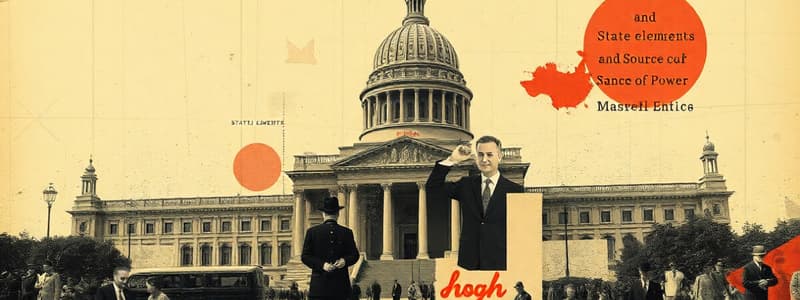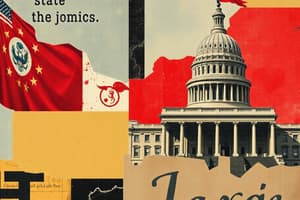Podcast
Questions and Answers
What is politics according to Harold Laswell?
What is politics according to Harold Laswell?
- Who gets to decide the laws
- Who gets what, when, and how (correct)
- Who influences public opinion
- Who organizes community events
What is the heart and soul of politics?
What is the heart and soul of politics?
- legal documents
- governance structure
- political parties
- decision making (correct)
What is indicated as a necessary involvement in the context of politics?
What is indicated as a necessary involvement in the context of politics?
- Choosing to ignore governmental affairs
- Engaging in political campaigns
- Staying informed and interested (correct)
- Debating political theories
What examples illustrate personal politics in day-to-day life?
What examples illustrate personal politics in day-to-day life?
What does the struggle for power within organizations generally lead to?
What does the struggle for power within organizations generally lead to?
Which phrase represents a broader concept related to the welfare of the community?
Which phrase represents a broader concept related to the welfare of the community?
What does the term 'de jure' refer to in the context of international recognition?
What does the term 'de jure' refer to in the context of international recognition?
Which of the following best defines a state?
Which of the following best defines a state?
What is an essential characteristic of a failed state?
What is an essential characteristic of a failed state?
What distinguishes a government from a state?
What distinguishes a government from a state?
Anarchy refers to which of the following scenarios?
Anarchy refers to which of the following scenarios?
Which of the following best describes 'sovereignty'?
Which of the following best describes 'sovereignty'?
Which factor is not typically associated with the definition of a state?
Which factor is not typically associated with the definition of a state?
Which statement is true regarding international recognition of a state?
Which statement is true regarding international recognition of a state?
What does Pluralist Theory emphasize about society?
What does Pluralist Theory emphasize about society?
Which of the following accurately describes the State-centered Theory's perspective on diplomacy?
Which of the following accurately describes the State-centered Theory's perspective on diplomacy?
What was a key feature of diplomacy during World War II according to the theories discussed?
What was a key feature of diplomacy during World War II according to the theories discussed?
What does Elitist Theory suggest about political decision-making?
What does Elitist Theory suggest about political decision-making?
Which international relations theory emphasizes power and national interest?
Which international relations theory emphasizes power and national interest?
In what way did the actions of the Allied powers during World War II reflect the conclusions drawn about effective leadership?
In what way did the actions of the Allied powers during World War II reflect the conclusions drawn about effective leadership?
What does the term 'anarchic international system' refer to in the context of realism?
What does the term 'anarchic international system' refer to in the context of realism?
What does the critique of Elitist and Pluralist Theory address?
What does the critique of Elitist and Pluralist Theory address?
What is one of the key elements that defines a state?
What is one of the key elements that defines a state?
Which method of control is indicated by the term 'Force'?
Which method of control is indicated by the term 'Force'?
What does the element 'Defined Territory' imply about a state?
What does the element 'Defined Territory' imply about a state?
In the context of authority, what role do subordinates play?
In the context of authority, what role do subordinates play?
How is 'Power' defined in the context provided?
How is 'Power' defined in the context provided?
Which of the following is NOT a source of authority?
Which of the following is NOT a source of authority?
What does 'International Recognition' signify for a state?
What does 'International Recognition' signify for a state?
Which of the following best describes the concept of 'Authority'?
Which of the following best describes the concept of 'Authority'?
What is a significant challenge faced by states without a central authority?
What is a significant challenge faced by states without a central authority?
What defines the relationship between a government and a state?
What defines the relationship between a government and a state?
Which of the following is an example of a stateless nation?
Which of the following is an example of a stateless nation?
Why can't a government exist without a state?
Why can't a government exist without a state?
What does the traditional definition of a state emphasize?
What does the traditional definition of a state emphasize?
During which scenario may a state temporarily lack a central authority?
During which scenario may a state temporarily lack a central authority?
What is one of the primary roles of a government within a state?
What is one of the primary roles of a government within a state?
Which theory addresses inequalities between sexes in the context of power?
Which theory addresses inequalities between sexes in the context of power?
Flashcards are hidden until you start studying
Study Notes
5 Elements of the State
- Defined Territory: A state must have well-defined borders recognized as its physical boundaries.
- Permanent Population: A state requires a permanent population residing within its territory.
- Functional Government: A state needs a governing body responsible for enacting and enforcing laws, providing services, and representing the nation internationally.
- Sovereignty: A state possesses the supreme authority over its territory, free from external control.
- (International Recognition): While not formally included in the five elements, international recognition by other states and organizations validates the state’s legitimacy.
Power
- Power is the capacity to exert influence and control over others.
- Sources of Power:
- Force: The ability to use physical or military might to compel obedience.
- Money: The utilization of financial resources to influence or control others.
- Welfare: Providing for the well-being of others, including the entire community, can grant a sense of obligation and authority.
Politics
- Politics involves decision-making within a unit of rule, aiming to reconcile diverse interests by granting power proportional to each group's contribution to the community's welfare and survival.
State vs. Government
- State: A political entity with defined territory, permanent population, sovereignty, and a government.
- Government: The ruling body of a state, responsible for lawmaking, enforcement, service provision, and representing the state abroad.
Anarchy and Failed States
- Anarchy: A state lacking a functional government resulting in the absence of central authority to enforce laws or provide essential services.
- Failed State: A nation where the government has lost control over a considerable portion of its territory or is unable to effectively govern.
Theories of Power
- Pluralist Theory: Power is distributed among various groups in society, recognizing the value of diversity and promoting autonomy.
- Elitist Theory: Power is concentrated in the hands of a small elite group that dominates political decision-making.
- Feminist Theory: Seeks to understand and address inequality between genders in terms of power dynamics.
- State-Centered Theory: Power resides primarily within the state, focusing on its actions and interactions in the international system.
National Interest:
- Realists believe that states prioritize their own national interests, which may include economic prosperity, military security, and political influence.
- Diplomacy and force are tools for achieving national interests.
- The conflict in World War II is an example of realism in action, where nations pursued power and security in an anarchic international system.
Studying That Suits You
Use AI to generate personalized quizzes and flashcards to suit your learning preferences.




